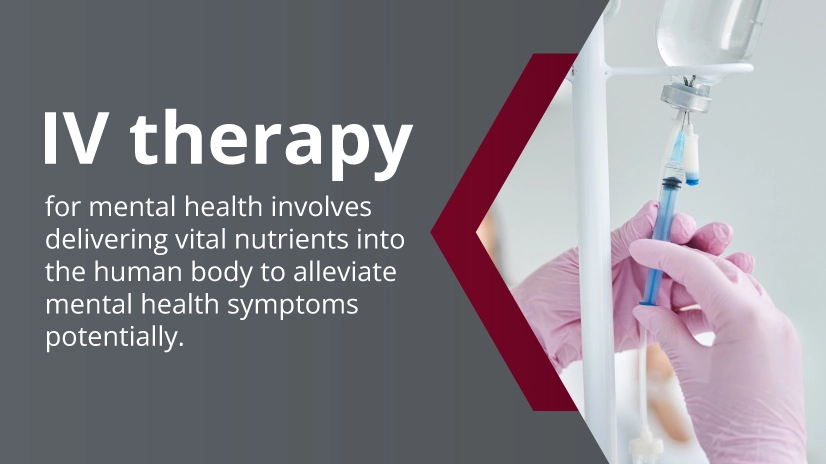
Exploring IV Therapy For Mental Health
In recent years, IV therapy has gained attention for its potential benefits in managing mental health disorders. This treatment involves injecting vitamins, minerals, and other nutrients into the bloodstream through an IV drip.
Unlike traditional oral supplements, IV therapy allows for higher absorption rates, which proponents suggest may effectively support mental well-being. Continue reading as we delve into the role of IV therapy in mental health treatment.
Key Takeaways
IV therapy involves delivering vital nutrients directly into the bloodstream to alleviate mental health symptoms potentially. This article covers:
- IV therapy includes various types, each used to address different mental health conditions, such as depression and anxiety.
- IV therapy offers significant benefits for mental health by providing targeted treatment that addresses key aspects of well-being.
- IV therapy for mental health involves a structured process to ensure personalized and effective treatment for those affected.
Contact Indiana Center for Recovery at (844) 650-0064 to explore our mental health care services, tailored to your needs.

Introduction To IV Therapy For Mental Health
IV therapy, short for intravenous therapy, involves administering fluids, minerals, vitamins, and prescription medication directly into the blood circulation through a vein. This innovative method bypasses the digestive system, allowing for faster absorption and immediate effects. In mental health care, IV therapy is gaining attention for its potential benefits beyond traditional treatments.
IV therapy sessions typically involve a healthcare provider inserting a small needle into a vein to deliver a customized blend of nutrients tailored to individual needs. Common components include vitamin B complex, magnesium, amino acids, and antioxidants. The procedure is usually conducted in a clinical setting under medical supervision.
Recent studies suggest that IV therapy may help alleviate symptoms of severe depression, anxiety, and chronic stress by restoring nutrient deficiencies and promoting neurotransmitter balance. While more research is needed to understand its efficacy fully, many individuals report feeling immediate relief and improved mental clarity following IV therapy sessions.
Types Of IV Therapy
In the realm of mental health care, various types of IV therapies have emerged as promising options. Let’s explore some of these therapies:
Vitamin Infusions
Vitamin therapy involves delivering high doses of essential vitamins directly into the patient’s bloodstream, which may help address deficiencies that can lead to the onset of mood disorders and fatigue. These infusions ensure maximum absorption and quicker therapeutic effects by bypassing the gut.
NAD+ Therapy
NAD+ (Nicotinamide Adenine Dinucleotide) therapy involves infusing NAD+ directly into the bloodstream. NAD IV therapy is crucial for cellular energy production and has shown promise in supporting brain function and mental clarity, potentially aiding medical conditions like depression and anxiety.
Amino Acid Therapy
Amino acid therapy utilizes intravenous administration of specific amino acids, considered the building blocks of proteins. These treatments aim to rebalance neurotransmitters in the human brain, such as serotonin and dopamine, essential in regulating mood and behavior.
Ketamine Infusions
Ketamine infusion therapy is increasingly used for treatment-resistant depression (TRD) and severe cases of anxiety disorders. Administered intravenously in controlled settings, ketamine therapy can rapidly alleviate symptoms, offering relief where other treatments have failed.
Mental Health Conditions Treated With IV Therapy
IV therapy has emerged as a complementary treatment option for various mental health conditions. Let’s explore some of these conditions:
Major Depression
IV therapy is increasingly considered a complementary treatment of depression symptoms. Delivering vital nutrients directly into the blood circulation aims to support brain function and mood regulation, potentially alleviating symptoms of sadness, low energy, and loss of interest in activities.
Anxiety
Anxiety disorders, like generalized anxiety disorder (GAD) and social anxiety, may benefit from IV therapy. Nutrient deficiencies can contribute to anxiety symptoms such as excessive worry, restlessness, and difficulty concentrating. IV therapy targets these deficiencies to promote a sense of calm and overall health.
Bipolar Disorder
For individuals with bipolar disorder, IV therapy offers a supplemental approach to managing mood swings and stabilizing mood fluctuations. By ensuring adequate nutrient levels critical for brain health, IV therapy aims to support mood balance alongside traditional treatments.
Post-Traumatic Stress Disorder (PTSD)
Post-traumatic stress disorder (PTSD) involves persistent mental and emotional stress following a traumatic event. IV therapy may help by replenishing nutrients depleted due to chronic stress and trauma, potentially reducing symptoms such as flashbacks, hypervigilance, and emotional numbness.
Chronic Fatigue Syndrome
IV therapy is also explored for its potential in managing chronic fatigue syndrome (CFS), a condition characterized by profound tiredness that doesn’t improve with rest. IV therapy aims to boost energy levels and improve overall vitality by delivering essential nutrients directly into the bloodstream.
Benefits Of IV Therapy For Mental Health
IV therapy offers significant benefits for mental health by providing targeted treatment that addresses key aspects of well-being. Here are some of these advantages:
Rapid Symptom Relief
One of the primary advantages of IV therapy is its ability to deliver nutrients and medications directly into the bloodstream, bypassing the digestive system. This allows for rapid relief of symptoms such as anxiety, depression, and fatigue, providing almost immediate effects compared to oral medications.
Enhanced Nutrient Absorption
By delivering nutrients directly into the circulation, IV therapy ensures maximum absorption compared to oral supplementation. This is particularly valuable for those with digestive issues that may impair nutrient absorption, ensuring they get the vital vitamins and minerals necessary for mental health.
Potential For Customization
Depending on specific deficiencies or health conditions, IV therapy can be tailored to meet individual needs. Healthcare providers can include a mix of vitamins, minerals, amino acids, and antioxidants in the infusion to address unique symptoms and optimize mental health outcomes.
Improved Overall Well-Being
Regular IV therapy sessions can improve overall well-being by supporting brain function, enhancing energy levels, and promoting a sense of mental clarity and emotional stability. This innovative approach results in better mood regulation and increased resilience against stressors.
The Process Of IV Therapy
IV therapy for mental health involves several essential steps to ensure effective treatment and monitoring of patients. Let’s explore these steps:
Initial Consultation And Diagnosis
The process begins with an initial consultation, during which healthcare providers assess the patient’s mental health concerns and medical history. This step helps diagnose specific conditions and determine the suitability of IV therapy as part of the treatment plan.
Customization Of Treatment Plan
Healthcare providers customize each patient’s mental health treatment plan based on the diagnosis and individual needs. This involves selecting the appropriate nutrients, vitamins, and medications to be administered via IV, tailored to address the patient’s mental health symptoms and overall well-being.
Administration Of Therapy
During the administration phase, patients receive IV therapy in a hospital setting under the close supervision of trained healthcare professionals. The therapy involves the gradual infusion of fluids, nutrients, and medications directly into the bloodstream, ensuring rapid absorption and effectiveness.
Monitoring And Follow-Up
Throughout IV therapy, patients are closely monitored to evaluate their response to treatment and adjust the plan as needed. Follow-up appointments allow healthcare providers to evaluate progress, address potential side effects, and make necessary adjustments to optimize therapeutic outcomes.
Frequently Asked Questions (FAQ)
Does IV therapy work for anxiety?
IV therapy for anxiety involves delivering vitamins and minerals directly into the circulation through an IV drip. Some believe it helps reduce anxiety by replenishing nutrients and boosting energy levels. The most common ingredients are magnesium, B vitamins, and vitamin C.
While some people report feeling better after IV therapy, there is limited scientific evidence to prove its effectiveness for anxiety. It might offer temporary relief, but it’s not a cure. Always talk to a primary care doctor before trying new treatments for anxiety to ensure it’s safe and appropriate for you.
What conditions require IV therapy?
IV therapy is used for various conditions. It helps treat dehydration, severe infections, and nutritional deficiencies. People with chronic illnesses, like Crohn’s disease or cancer, often need IV therapy to receive essential nutrients and medications. IV therapy is also used during surgeries to provide fluids and anesthesia.
In addition, IV therapy can deliver vitamins and minerals that may improve mood and energy levels. Some people use it to manage symptoms of anxiety, depression, or stress. However, the efficacy for mental health is not well-proven, so it’s essential to consult a doctor before starting this treatment.
How long does a typical IV therapy session last, and how many sessions are usually needed?
A typical IV therapy session lasts about 30 minutes to an hour, depending on the treatment. One session might be enough to feel better for hydration or nutrient replenishment. However, for chronic conditions or mental health support, multiple sessions over weeks or months are often needed.
The number of sessions varies based on the individual’s health needs and how they respond to the therapy. Healthcare providers monitor progress and adjust the treatment plan to ensure it’s effective and safe. Always follow your doctor’s recommendations regarding the frequency and duration of IV therapy sessions.
IV Therapy Support within Clinical Mental Health Treatment
IV therapy may deliver targeted nutrients rapidly, but we always situate that supportive modality within a full clinical mental health plan. At Indiana Center for Recovery, our comprehensive mental health treatment programs begin with a thorough assessment, then layer evidence-based therapies, medication management, and lifestyle coaching with optional IV sessions—vitamin infusions, NAD+, amino acids—to address fatigue, depression, anxiety, or treatment-resistant stress. When symptoms intensify, inpatient psychiatric services offer round-the-clock support, while flexible outpatient treatment keeps you connected as you translate the biochemical boost into healthy coping, and integrated dual diagnosis treatment handles any overlapping substance use.
Our treatment centers throughout Indiana provide judgment-free, evidence-based care so you can explore IV therapy safely alongside therapies that target thinking, feeling, and behavior. Call us right now at (844) 650-0064 to see if IV support complements your personalized recovery plan.



 100% Confidential
100% Confidential
